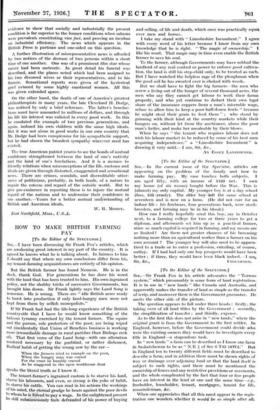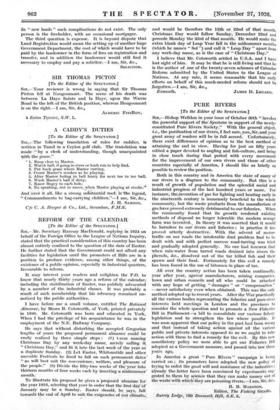[To the Editor of the SrEcTATon.] SIR,—Sir Frank Fox in
his article advocates the " Torrens system," which presumably is some form of land registration. It is in use in " new lands " like Canada and Australia, and apparently makes the transfer of land as simple as the transfer of scrip, and moreover there is the Government guarantee. He omits the other side of the picture.
The question appears to fall under three heads : firstly, the taking over of all land titles by the Government ; secondly, the simplification of transfer ; and thirdly, expense.
As to the first this does not arise in " new lands," where the original grant is from the Government to the first settler. In England, however, before the Government could decide who were the existing owners they would have to investigate every title in England—a stupendous task.
In " new lands " a farm can be described as I know one farm in Saskatchewan to be as " NiE I of Sec 6 T43 18W2." But in England ten to twenty different fields must be described to describe a farm, and in addition there must be shown rights of way or drainage over adjoining land or that the land itself is subject to such rights, and there must be mentioned the ownership of fences and any restrictive provisions or covenants, and the whole complicated by the fact that four or five people have an interest in the land at one and the same time—e.g., freeholder, leaseholder, tenant, mortgagee, tenant for life, remainderm— an, &c.
When one appreciates that all this must appear in the regis- tration one wonders whether it would be so simple after all.
In " new lands " such complications do not exist. The only person is the freeholder, with an occasional mortgagee.
The third question is expense. It is beyond dispute that Land Registration would mean the setting up of another Tinge Government Department, the cost of which would have to be paid by the landowner in the form of fees on; registration and transfer, and in addition the landowner would still find it necessary to employ and pay a solicitor.—I am, Sir, &c.,
SOLICITOR.



















































 Previous page
Previous page